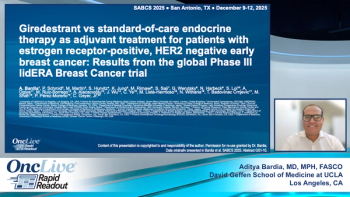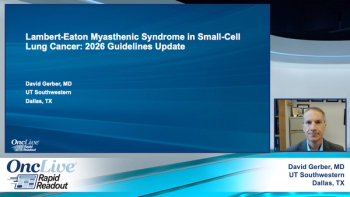
|Videos|June 30, 2021
Rapid Readouts: Extended Follow-up From the Phase 3 ARAMIS trial
Neal Shore, MD, presents data on the tolerability of and responses to darolutamide (DARO) as seen in the extended follow-up of the phase 3 ARAMIS trial of DARO treatment in men with high-risk, nonmetastatic, castration-resistant prostate cancer. The results were reported at the 2021 American Society of Clinical Oncology (ASCO) Annual Meeting.
Advertisement
Neal Shore, MD, discusses data from the following presentation:
- DARO tolerability and treatment response in the extended follow-up of the phase 3 ARAMIS trial (
Shore, ASCO 2021, abstract 5079 )- The study’s objective is to examine the tolerability and treatment response data of DARO treatment in men with high-risk, nonmetastatic, castration-resistant prostate cancer from the extended follow-up of the phase 3 ARAMIS trial (NCT02200614).
- Phase 3 trial extended follow-up:
- Comparator arm: DARO (600 mg) 2x daily
- Control arm: placebo (2 matching tablets) 2x daily
- After primary analysis for metastasis-free survival, patients could continue onto an open-label trial with DARO treatment
- Extended follow-up end points examined dose tolerability and treatment response by pharmacodynamic modeling and landmark sensitivity analysis
- Conclusions: Treatment response
- DARO is a structurally distinct androgen receptor inhibitor that demonstrated benefits in:
- Prostate-specific antigen (PSA) response. Occurred in 84.0% and 84.5% of patients treated with DARO in the double-blind and double-blind-plus-open-label treatment periods, respectively, vs 7.9% of patients treated with placebo
- A PSA response was noted in 31.6% of patients who crossed over from placebo to DARO treatment in the open-label treatment period.
- Survival. 95% of patients treated with DARO in the initial treatment period were alive after 2 years.
- Pharmacodynamic modeling demonstrated a positive association between a longer overall survival (OS) and maximum PSA decline in patients treated with DARO.
- A landmark sensitivity analysis at week 16 demonstrated a further positive association between maximum PSA decline at week 16 and subsequent OS.
- Prostate-specific antigen (PSA) response. Occurred in 84.0% and 84.5% of patients treated with DARO in the double-blind and double-blind-plus-open-label treatment periods, respectively, vs 7.9% of patients treated with placebo
- Conclusions: Safety and tolerability
- DARO treatment was well tolerated in both the double-blind and open-label treatment periods within the ARAMIS study.
- Similar rates of discontinuation were noted in both treatment periods due to adverse events in the DARO and the placebo-treated groups (8.9% and 8.7%, respectively).
- A lower rate of discontinuation due to disease progression was noted in the DARO arm vs the placebo-treated group (12.5% vs 25.3%, respectively) during the double-blind treatment period; similar discontinuation rates were noted in the extended follow-up for both the double-blind and open-label treatment periods (12.6% each)
- 98.8% of patients in the trial received the full planned dose of DARO (in both the double-blind and open-label periods), with all patients who required dose adjustments able to reescalate to the full treatment dose.
- No significant cardiovascular or neurological safety events were noted in the extended follow-up, however a slight increase in fatigue was reported.
- In the ARAMIS trial, treatment with DARO demonstrated a favorable tolerability and safety profile, which will have clinical use implications.
Advertisement
Latest CME
Advertisement
Advertisement
Trending on OncLive
1
Single-Center, Retrospective Data Show Low Rate of Lifileucel Infusion Following Referral in Advanced Melanoma
2
Long-Term Cilta-Cel Data Show Low Rates of PFS Events in Standard-Risk R/R Myeloma
3
Real-World Data Support Clinical Benefit With Lifileucel in Previously Treated Advanced Melanoma
4
Dr Riedell on the Long-Term Efficacy of Tisa-Cel in R/R Follicular Lymphoma
5






































